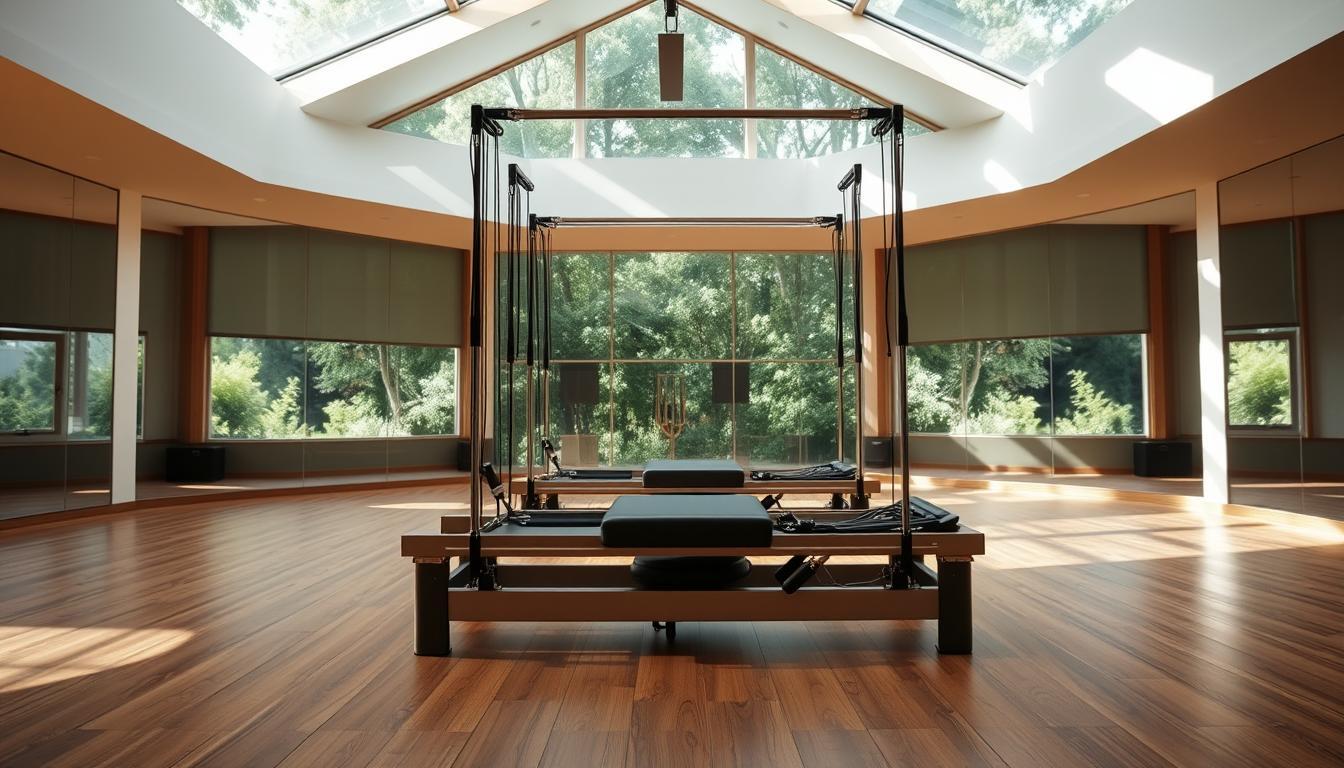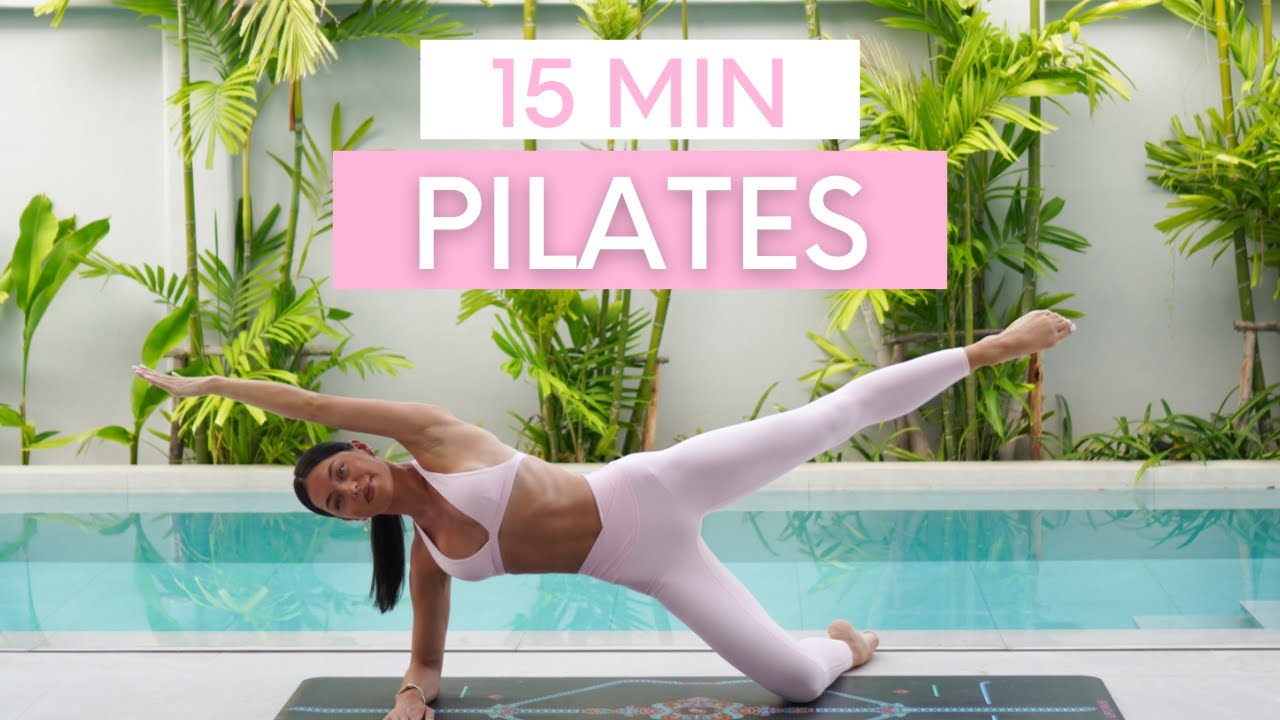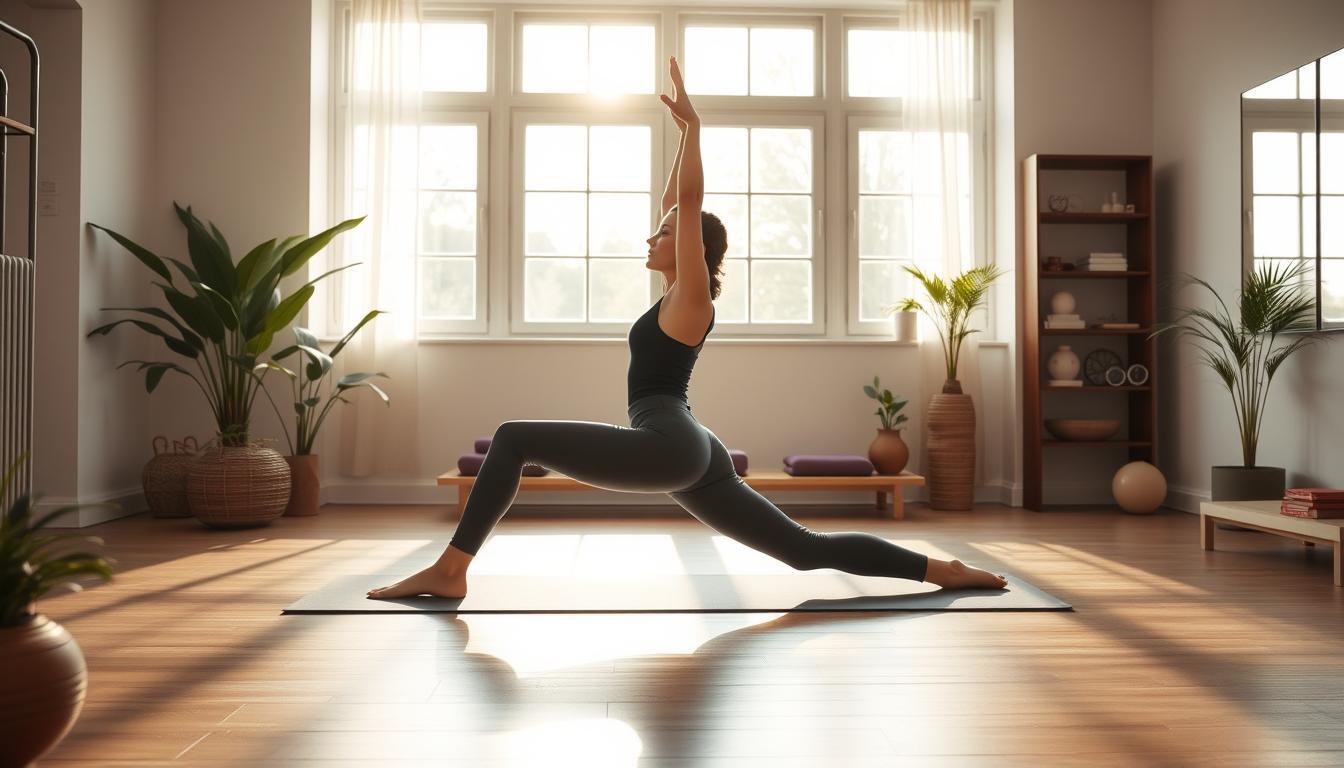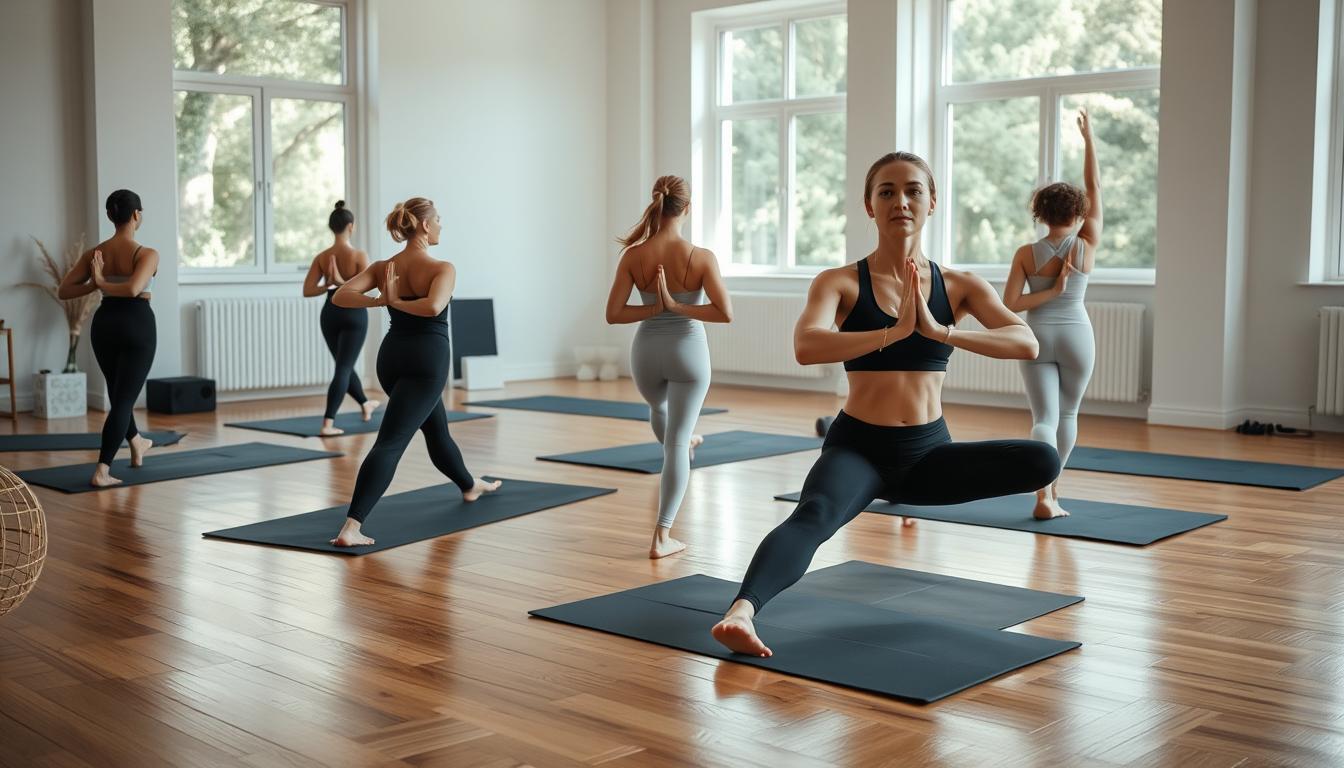Welcome to the ultimate guide on reformer Pilates! This guide is perfect for both beginners and experienced practitioners. It has everything you need to get the most out of the reformer.
Reformer Pilates has become very popular lately. It combines traditional Pilates with the use of a special machine called the reformer. This machine offers resistance and support, leading to a full-body workout. It strengthens muscles, boosts flexibility, and improves overall fitness.
In this guide, we’ll explore the history, benefits, and key principles of reformer Pilates. You’ll learn about the equipment, proper form, and how to create a workout routine that fits your goals.
Key Takeaways
- Discover the transformative benefits of reformer Pilates for your mind and body
- Understand the history and evolution of this dynamic workout method
- Familiarize yourself with the reformer equipment and its versatile features
- Learn proper techniques, safety guidelines, and how to avoid common mistakes
- Explore a wide range of reformer Pilates exercises, from beginner to advanced
- Customize your workout routine to target specific muscle groups and fitness goals
- Discover strategies for progressive training and maintaining your reformer Pilates practice
Understanding Reformer Pilates: Essential Introduction
Reformer Pilates has a long history, starting with Joseph Pilates’ vision. It’s a mix of physical and mental benefits. Knowing its roots and principles is key to enjoying its full benefits.
History and Evolution of Reformer Pilates
Joseph Pilates created the reformer machine in the early 1900s. He wanted to help others after his own health issues. The reformer, with its sliding carriage and attachments, is central to Pilates’ fitness and rehab approach.
Benefits for Mind and Body
- Improved muscle tone and strength
- Enhanced flexibility and joint mobility
- Better balance and coordination
- Increased core stability
- Stress reduction and improved mental well-being
Key Principles of Reformer Practice
- Concentration: Focus and mindfulness in each exercise.
- Control: Precise control in movements.
- Centering: Core muscles support and stabilize the body.
- Flow: Smooth transitions between exercises.
- Breathing: Proper breathing enhances the mind-body connection.
- Precision: Attention to form and alignment in each exercise.
“Pilates teaches you to be in control of your body and not at the mercy of it.” – Joseph Pilates
Understanding reformer Pilates’ history, benefits, and principles prepares you for a transformative journey. It nourishes both your body and mind.
Getting to Know Your Reformer Equipment
To master Reformer Pilates, knowing the parts of the equipment is key. The carriage moves smoothly, and the springs offer resistance. Each part is vital for a great workout.
The carriage supports your body for many exercises. Pushing and pulling it works your muscles and improves balance. The springs add resistance, helping you get stronger and more toned.
The footbar is important for your feet during exercises. Changing its position targets different muscles and improves balance. The straps help control your upper body, enhancing your technique.
| Reformer Part | Function |
|---|---|
| Carriage | Supports the body and allows for controlled movement |
| Springs | Provide variable resistance to challenge the muscles |
| Footbar | Serves as an anchor point for the feet during exercises |
| Straps | Engage the upper body and refine technique |
Knowing how each Pilates reformer part works helps you use the equipment fully. This will improve your Reformer Pilates practice.
Safety Guidelines and Proper Form Techniques
When you do Reformer Pilates, safety and proper form are key. They help you get the most out of your workout and avoid injuries. Let’s look at what you need to remember.
Common Mistakes to Avoid
Reformer Pilates needs precise movements and the right body alignment. Here are some mistakes to steer clear of:
- Locking your joints, especially the knees and elbows
- Arching or rounding your back too much
- Holding your breath during exercises
- Gripping the reformer too tightly
- Rushing through the movements
Keeping the right Pilates form is vital. It helps prevent injuries and lets you enjoy the workout’s full benefits.
Proper Breathing Techniques
Controlled breathing is a big part of Reformer Pilates. Here’s how to breathe right:
- Inhale through your nose and exhale through your mouth
- Match your breathing with the movements
- Don’t breathe too shallowly or hold your breath
- Use deep breathing to engage your core
Good breathing improves your Pilates practice. It also helps with body alignment and muscle use.
Alignment Fundamentals
Getting your body alignment right is crucial. It helps you get the best results and stay safe. Here’s what to focus on:
- Keep your spine in a neutral position
- Align your shoulders, hips, and ankles
- Use your core to support your spine
- Spread your weight evenly on the reformer
Learning these alignment basics will make you better at Reformer Pilates. You’ll do exercises more precisely and efficiently.
Always put safety and proper form first in Reformer Pilates. Knowing and following these tips will help you have a safe and effective Pilates experience.
Beginner’s Guide to Reformer Pilates Workout
Starting your beginner Pilates journey? The reformer Pilates workout is a great place to begin. It uses special equipment to help you build strength, flexibility, and body awareness. This guide will help you start strong with introductory exercises and starting reformer Pilates.
First, get to know the reformer’s setup and features. Learn how to adjust the resistance and footbar. Also, explore the straps and loops to help with your movements.
- Start with basic exercises like Pilates footwork, leg circles, and pelvic tilts. These moves will help you connect with your core and improve your posture.
- Next, try exercises that challenge your balance, like single-leg work and arm-leg coordination. These will improve your stability and control.
- Always focus on breathing techniques and alignment fundamentals. Keep your spine neutral, engage your core, and move with purpose.
Be patient and consistent when starting beginner Pilates on the reformer. Celebrate your small wins and don’t hesitate to ask for help. With time, you’ll gain confidence and skills for more advanced workouts.
“The reformer is a versatile and transformative piece of equipment that can elevate your Pilates practice to new heights. Embrace the journey, and enjoy the ride!”
| Beginner Reformer Pilates Exercises | Focus Areas |
|---|---|
| Pilates Footwork | Core, Leg Strength |
| Leg Circles | Flexibility, Hip Mobility |
| Pelvic Tilts | Posture, Spinal Awareness |
| Single-Leg Work | Balance, Stability |
| Arm-Leg Coordination | Whole-Body Integration |
Core Strengthening Exercises on the Reformer
Unlock your core strength with the reformer. It’s a versatile tool for Pilates. Start with basic exercises and move to advanced ones, all while keeping proper form.
Basic Core Movements
Begin with exercises that target your abdominal muscles. These exercises are the foundation of your practice. Try the abdominal curl, leg circles, and double-leg stretch to strengthen your core and improve stability.
- Abdominal Curl
- Leg Circles
- Double-Leg Stretch
Advanced Core Sequences
When you’ve got the basics down, try more complex exercises. Try the open-leg rocker, saw, and teaser to level up your Pilates. These exercises require more control, flexibility, and strength.
- Open-Leg Rocker
- Saw
- Teaser
Modification Options
Pilates is all about adapting to your needs. No matter your fitness level, you can modify exercises. Try changing the resistance, range of motion, or support to find the right challenge for you.
Discover the power of the reformer for a strong core. It offers a wide range of exercises, from simple to complex. Experiment and customize your workouts to reach your goals.
Upper Body Reformer Pilates Sequences
Boost your upper body strength and improve shoulder mobility with these Reformer Pilates sequences. Use the Reformer to shape and strengthen your arms, shoulders, and back. This will change your upper body workout for the better.
Arm Exercises
Work your biceps, triceps, and forearms with these arm-focused Reformer exercises. Try triceps extensions and biceps curls to build strength and definition in your upper limbs.
- Triceps Press
- Arm Circles
- Biceps Curls
- Shoulder Taps
Shoulder Strengthening
Boost your shoulder strength and stability with Reformer exercises. These exercises target the deltoids and rotator cuff muscles. They help improve your posture and lower the risk of shoulder injuries.
- Overhead Press
- Reverse Fly
- Lateral Raises
- Scapular Retractions
Back-Focused Sequences
Strengthen and lengthen your back muscles with these Reformer exercises. They target both the upper and lower back. This helps build a strong core and improves your upper body posture and alignment.
| Exercise | Target Muscles | Benefits |
|---|---|---|
| Rowing | Lats, Rhomboids, Traps | Improved Posture, Increased Back Strength |
| Kneeling Chest Flies | Pectoralis Major, Pectoralis Minor | Chest Muscle Activation, Shoulder Mobility |
| Superman | Erector Spinae, Glutes | Enhanced Core Stability, Lower Back Strengthening |
Add these upper body Reformer Pilates sequences to your workout routine. They help build strength, improve posture, and achieve a balanced, toned physique. Always focus on proper form and breathe deeply to get the most out of each exercise.
“The secret to getting ahead is getting started.” – Mark Twain
Lower Body and Flexibility Training
Unlock the true power of your lower body with these Pilates reformer exercises. They help strengthen your hips and thighs. They also improve the mobility of your ankles and feet.
Hip and Thigh Exercises
Make your legs stronger and more sculpted. Focus on the hips and thighs. Try exercises like the single-leg kick, outer thigh lifts, and side-lying leg circles.
Ankle and Foot Work
Don’t forget the muscles in your ankles and feet. Pilates reformer exercises like ankle pumps, foot circles, and toe taps help. They improve stability, balance, and flexibility.
Stretching Sequences
Add stretching routines to your workouts. This boosts your Pilates stretches and lower body flexibility. Try dynamic and static stretches for the hips, hamstrings, and calves.
| Exercise | Description | Benefits |
|---|---|---|
| Single-Leg Kick | Extend one leg out, pressing through the heel, then bring the leg back in towards the chest. | Strengthens the quadriceps and hip flexors. |
| Outer Thigh Lifts | Lie on your side and lift your top leg up, keeping it straight and engaged. | Targets the gluteus medius and outer thigh muscles. |
| Ankle Pumps | Flex and point your feet, engaging the anterior and posterior leg muscles. | Improves ankle mobility and strengthens the lower leg. |
“Pilates reformer exercises are an excellent way to target the often-overlooked lower body and increase overall flexibility.”
Creating Your Custom Reformer Pilates Workout
Creating a personalized Pilates routine on the reformer can change your fitness journey. It helps you reach your goals by using the reformer’s unique benefits. Tailoring your workout plan makes your Pilates practice more effective and brings real results.
To make a custom reformer Pilates workout, find the right mix of exercises and intensities. Here’s how to begin:
- Assess your fitness level and goals. Your workout should match your needs, whether it’s building core strength, improving flexibility, or enhancing body conditioning.
- Incorporate a variety of movements. Mix basic and advanced exercises to target different muscles. This ensures a balanced workout that challenges your body in new ways.
- Adjust the resistance and intensity. Play with the reformer’s adjustable resistance to find the perfect level. It should challenge you without sacrificing form.
- Listen to your body and adjust as needed. Pay attention to your body’s signals. Modify exercises or take breaks when needed.
By following these steps, you can design a Pilates routine that meets your workout planning and fitness goals. This makes your Pilates practice more engaging, effective, and transformative.
| Exercise Type | Benefits | Recommended Frequency |
|---|---|---|
| Core Strengthening | Improved posture, balance, and stability | 2-3 times per week |
| Upper Body Conditioning | Increased arm and shoulder strength | 1-2 times per week |
| Lower Body Exercises | Enhanced leg and glute muscle tone | 1-2 times per week |
| Flexibility Sequences | Improved range of motion and mobility | 2-3 times per week |
“Crafting a personalized Pilates routine is the key to unlocking your full potential and achieving your fitness goals.”
Progressive Training: Advancing Your Practice
Ready to level up your reformer Pilates? Dive into intermediate and advanced moves to test your body and mind. With progressive overload, you’ll keep pushing your limits, avoiding plateaus and reaching new heights in strength, flexibility, and control.
Intermediate Movements
As you grow in Pilates, try more demanding exercises. Add the single-leg circle, double-leg kick, and running man to your routine. These moves boost your core strength and balance. They demand more stability, coordination, and muscle power, helping you master advanced Pilates.
Challenge Variations
- Add springs or handles to up the resistance in your workout.
- Try dynamic moves like the jumping jack or tuck jump for explosive power.
- Single-leg or unilateral exercises, like the single-leg tendon stretch or single-arm pull, test your balance and control.
- Explore new footwork patterns and sequences to up your agility and coordination.
Progressive training means slowly upping the ante in your Pilates. Get help from seasoned instructors to keep your form right and stay safe while trying these tough exercises.
| Exercise | Description | Benefits |
|---|---|---|
| Single-Leg Circle | Make a full circle with one leg, keeping stable and controlled. | Boosts core strength, balance, and coordination. |
| Double-Leg Kick | Kick both legs at once against resistance, engaging your core and hip flexors. | Strengthens the core, hip flexors, and lower body muscles. |
| Running Man | Mimic running on the reformer, challenging your stability and coordination. | Builds explosive power, cardiovascular fitness, and agility. |
Step up to the challenge and reach your full potential with progressive reformer Pilates. Mastering intermediate moves and trying new variations will keep improving your strength, flexibility, and fitness.
Post-Workout Recovery and Maintenance
Starting a Reformer Pilates workout routine is great for your core, flexibility, and overall health. But, don’t forget to focus on recovery and maintenance after your workouts. This helps you keep improving and avoid injuries.
Stretching for Pilates Recovery
Stretching after Pilates helps with muscle soreness and quick recovery. Target your core, hips, and legs. Hold each stretch for 30 seconds to a minute, and breathe deeply to relax and improve flexibility.
Self-Care Practices for Pilates Enthusiasts
Stretching is just the start. Other self-care activities can also help your Pilates recovery and practice. Here are some ideas:
- Foam rolling to release muscle tension and promote circulation
- Epsom salt baths to soothe aching muscles
- Hydration and proper nutrition to replenish energy and aid recovery
- Adequate rest and sleep to allow your body to repair and rejuvenate
Maintaining Your Reformer Pilates Practice
To keep your Pilates practice going strong, make maintenance a habit. Regular check-ins with your instructor, cross-training, and watching for muscle soreness or imbalances are key. By focusing on recovery and maintenance, you’ll reach your Pilates goals and enjoy its lasting benefits.
“Taking the time to properly recover and maintain your Reformer Pilates practice is just as important as the workout itself. Investing in your self-care will pay dividends in the long run.”
Conclusion
In this guide, you’ve learned a lot about Reformer Pilates. You now know its history, benefits, and key principles. You’re ready to start your Pilates journey with confidence.
Practicing Reformer Pilates regularly brings many benefits. It strengthens your core, improves flexibility, and enhances posture and balance. As you keep doing Reformer Pilates, you’ll see how it improves your overall health. This will boost your Pilates benefits and support your fitness journey.
Reformer Pilates is more than a workout; it’s a lifestyle choice. It positively affects your physical and mental health. Stay committed to your long-term practice. Let Reformer Pilates be a key part of your wellness journey. Unlock the full potential of your body and mind with this transformative practice.
FAQ
What is reformer Pilates and how does it differ from traditional mat Pilates?
Reformer Pilates uses a special machine called the Pilates reformer. This machine adds resistance to your workout. It makes the exercises more challenging than mat Pilates.
This method focuses on improving strength, flexibility, and body control. It’s a great way to get a better workout.
What are the key benefits of incorporating reformer Pilates into my fitness routine?
Reformer Pilates is good for both your mind and body. It strengthens your core and improves flexibility. It also helps with posture and balance.
It makes you more focused and aware of your body. It helps you feel more mindful.
How often should I practice reformer Pilates to see results?
How often you do reformer Pilates depends on your goals and current fitness level. Aim for 2-3 sessions a week for the best results.
Even one session a week can help improve your strength and flexibility. It’s all about consistency and patience.
What should I expect during my first reformer Pilates class?
Your first class will introduce you to the reformer and teach you how to use it. You’ll learn the basics of the exercises.
The instructor will guide you. You’ll do a challenging yet rewarding workout. It focuses on control and precision.
Are there any precautions or modifications I should consider when starting reformer Pilates?
Always talk to your doctor before starting reformer Pilates, especially if you have injuries or health issues. Your instructor can help with modifications.
They’ll make sure the workout is safe and right for you. This ensures you get the most out of your sessions.
How can I incorporate reformer Pilates into my existing fitness routine?
Reformer Pilates is a great addition to any fitness routine. Try to do it 2-3 times a week.
Combine it with cardio, strength training, and flexibility exercises. This balanced approach helps you reach your fitness goals.
What should I look for when choosing a reformer Pilates studio or instructor?
Look for a studio with experienced and certified instructors. They should use high-quality equipment.
Choose a studio that offers classes for all levels. This way, you can progress at your own pace.




